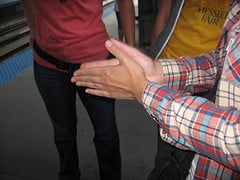
One test is a seated version of the finger-to-nose test, in which a person closes their eyes, tilts their head back, and puts their finger to their nose. Another test more specific to sitting down is called the palm-pat, in which a person “takes one palm up and claps the other hand palm down, then turns the upper hand over to clap with the back of their hand, back and forth, speeding up as they go.” The Pell City police department claims that the seated tests are just as accurate as the standing tests, which presents an issue of equivalence: What does it mean when someone passes a seated finger-to-nose but fails a standing finger-to-nose test? Are palm-pat tests truly equivalent to a walk-and-turn or one-leg stand test? Though it is unclear if Georgia will adopt these new seated field sobriety tests it is important to consider their implications. Pell City and other municipalities like it will set the standard for seated field sobriety tests if and when they become standard for roadside stops.

